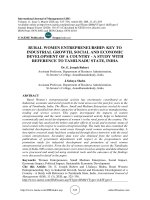Economic growth and economic development 679
Bạn đang xem bản rút gọn của tài liệu. Xem và tải ngay bản đầy đủ của tài liệu tại đây (140.41 KB, 1 trang )
Introduction to Modern Economic Growth
Again as in Chapter 13, we assume that all machines in both sectors are supplied
by monopolists that have a fully-enforced perpetual patent on the machines. We denote the prices charged by these monopolists at time t by χL (ν, t) for ν ∈ [0, NL (t)]
and χH (ν, t) for ν ∈ [0, NH (t)]. Once invented, each machine can be produced at
the fixed marginal cost ψ in terms of the final good, which we again normalize to
ψ ≡ 1 − β. This implies that total spending on machines at time t is given by
!
ÃZ
Z NH (t)
NL (t)
xL (ν, t) dν +
xH (ν, t) dν .
X (t) = (1 − β)
0
0
The innovation possibilities frontier is assumed to take a form similar to the lab
equipment specification in Chapter 13:
(15.7)
N˙ L (t) = η L ZL (t) and N˙ H (t) = η H ZH (t) ,
where ZL (t) is R&D expenditure directed at discovering new labor-augmenting
machines at time t, while ZH (t) is R&D expenditure directed at discovering Hcomplementary machines. Total R&D spending is the sum of these two, i.e.,
Z (t) = ZL (t) + ZH (t) .
The value of a monopolist that discovers one of these machines is again given by
the standard formula for the present discounted value of profits:
á
Z s
Z
Ê
Ô
0
0
exp
r (s ) ds χf (ν, s)xf (ν, s) − ψxf (ν, s) ds,
(15.8)
Vf (ν, t) =
t
t
where f = L or H, and r (t) is the market interest rate at time t. Once again, it
is sometimes more convenient to work with the Hamilton-Jacobi-Bellman version of
this value function, which takes the form:
(15.9)
r (t) Vf (ν, t) − V˙ f (ν, t) = χf (ν, t)xf (ν, t) − ψxf (ν, t).
Throughout, we normalize the price of the final good at every instant to 1, which
is equivalent to setting the ideal price index of the two intermediates equal to one,
i.e.,
(15.10)
Ô 1
Ê
(pL (t))1 + (1 − γ)ε (pH (t))1−ε 1−ε = 1 for all t,
where pL (t) is the price index of YL at time t and pH (t) is the price of YH . We also
denote the factor prices by wL (t) and wH (t).
665









